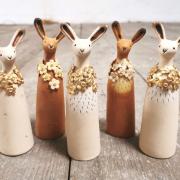It’s the highlight of the horticultural year and once again Devon will be well represented at the Chelsea Flower Show, as KATHRYN AALTO reveals in this special feature on the county’s best who are showing in West London

Message in a garden:

Exeter-based designer Hugo puts water issues at the core of his design
The RHS Chelsea Flower Show is the Paris Fashion Week of the horticulture world. This year staged from May 19-24, the grounds of the Royal Hospital Chelsea will be transformed into the world’s greatest and oldest flower show. It will be attended by royals, celebrities and 160,000 gardeners crawling out of hibernation.
For the uninitiated, it may seem a fantastical event: pop stars pose in show gardens on the Main Avenue. Flowers have security guards in the Great Pavilion. Millions of people around the world watch nightly coverage on the BBC with cameras panning over crowds and then diving into macro shots of bumblebees stumbling drunk in beautiful flowers.
Considered a fixture of British Summer, it provides worldwide gardening inspiration. If you haven’t got your ticket by the time you’re reading this, you may need to sharpen the secateurs for battle with gardeners who do, or plot some other way to beg, borrow or steal one.
The Chelsea Flower Show is also an important venue for watching emerging gardening trends in a range of areas from garden design, plants, furniture, art and tools. Now in its 101st year, the show is where new plants have been unveiled and many careers launched with gold medals.
This year, the Royal Horticultural Society is championing young horticultural talent. Emerging stars will be showcasing their gifts and panache on the Main Avenue while elsewhere in the showground, students and young people will have the opportunity to develop practical skills and learn about diverse career opportunities in horticulture.
One of those stars is 27-year-old Exeter-based garden designer Hugo Bugg. He grew up in Musbury, between Axminster and Lyme Regis, and graduated in Garden Design from the University of Falmouth.
In 2010, Hugo won the prestigious RHS Young Designer of the Year award. He won a gold medal at the Hampton Court Palace in 2011 as well as a gold at Tatton Park in 2010 where he also won Best in Show. He is widely considered one of the Britain’s brightest young design talents.
The Royal Bank of Canada has partnered with Hugo Bugg Landscapes to design their Main Avenue garden, the RBC Waterscape Garden. In keeping with the goals of the RBC Blue Water Project - a wide-ranging, ten-year global commitment established in 2007 to help protect the world’s fresh water resources, Hugo’s design is a creative response to an important issue.
Lynn Patterson, Director of Corporate Responsibility at RBC, says: “Hugo’s ability to take inspiration from a variety of sources and translate this into captivating garden design is truly commendable, and we are thrilled to be partnering with such an exciting talent for the 2014 Show.”
Hugo adds: “After a tough selection process, I was delighted to hear that I was their chosen designer. I have been wanting to do a Chelsea garden for years.”
Hugo explains that RBC’s brief was to create a beautiful garden with a strong message about urban water management: “I was keen to present a concept that was fresh and bold yet practical and pertinent.
“The RBC Waterscape Garden will profile cutting edge features that promote urban cooling, flood prevention and biodiversity, while strong forms and lines illustrate how sustainable design can be elegant.”
Symbolic and sophisticated, the RBC Waterscape Garden illustrates sustainable solutions for home gardeners in light of global water issues. Through innovative design techniques, it highlights the extremes between water abundance and water scarcity, while challenging visitors to take responsibility for managing water usage in their own gardens.
“My hope is that people will leave the garden empowered and inspired to improve water retention in their own gardens and to prevent water going into urban storm water systems,” says Hugo. “At the same time, I hope the beauty in the garden and its contemporary, cutting-edge design also inspires people.”
The garden replicates nature’s way of slowing down water, encouraging infiltration into the ground and taking pressure off urban drainage systems. It demonstrates naturally-occurring water management features which can be replicated as innovative alternatives to lawns and traditional paving.
Drawing inspiration from the parched nature of water-deprived landscapes, Hugo has been influenced by his work designing the Royal Botanic Garden on 450 arid acres in Jordan. His show garden illustrates this with layers of naturally-occurring geometric patterns representing parched earth, a symbol for two-thirds of the world under water stress. The resulting angles and striking motifs expose and conceal sections of the garden, enticing visitors to explore the space via a floating walkway.
A variety of plants will have different roles in the garden’s filtration, rain garden, and retention pools, inviting unusual combinations and contrasts. A range of trees, grasses and herbaceous perennials will attract, give shelter and provide food for birds and insects, while selected irises and geum ‘lemondrops’ will create a vibrant scene of blues, lime-greens and yellows.
“I have great interest in pushing the boundaries of garden design and take artistic inspiration from a wide range of sources – from fashion to interior design to sculpture,” reveals Hugo. “Every project offers creative design challenges and opportunities for collaboration.” He cites Dartmoor and the Devon coast as places he gains inspiration.
Although this is his first Chelsea appearance, Hugo appears unfazed by the pressure: “I set myself the highest standards for every garden I work on. I am competing with myself to deliver the best I can.”
And for downtime, Hugo isn’t trimming bonsai but training for a marathon and half-marathon, often running along the River Exe and coastlines.
Keep an eye out for local boy Hugo at this year’s Chelsea Flower Show. There will be more than flowers blooming there.
Find Hugo Bugg on Twitter @hugo_bugg
Saul is the show’s main man
At the core of keeping Chelsea the best it can possibly be is Show Manager Saul Walker, a Devonian through and through.
He explains: “I am originally from Plymouth where I lived for almost 24 years. I studied Archaeology and Prehistory at Sheffield University, after which I starting working for the National Trust at Antony House which is on the Rame Peninsula, near Torpoint. There I was a privately sponsored Carew-Pole Apprentice before becoming a full time gardener.
“In 2009 I moved to London when I was accepted to study on the Kew Diploma of Botanical Horticulture, a three-year course, after which I was re-employed by Kew as the Woodland Garden Botanical Horticulturist.
“It was during this time that a restructure at Kew meant I applied for and was recruited to work as the Deputy Show Manager, RHS Hampton Court Palace Flower Show for nine months before finally joining the RHS Chelsea Flower Show as the new Show Manager.
“My job is a mix of liaising with all the exhibitors – floral, nurseries, garden designers, main sponsors, landscape contractors to organise the content of the show, collaborating an all the show design, and working with our media partners to promote the show and the RHS.
“I met fellow Devonian Hugo Bugg recently. We have a number of young first time designers, which is a real theme in the show, so would be great to see his ideas come to reality!”
Find Saul Walker on Twitter @Aethylwyn
Loving lupins
Located in Woolsery, North Devon, show exhibitor Westcountry Nurseries has an excellent track record with over 15 years of growing experience. They specialise in lupins, the elegant spires of vertical interest with graceful flowers.
With owner Sarah Conibear as ‘Chief Happiness Officer’, they grow their own plants, breed their own lupins and are primarily a mail order business. They also sell a wide range of herbaceous perennials, alpines, ferns, grasses, bulbs, climbers, clematis, dieramas, with a few shrubs and trees for sale.
In 2013, Westcountry Nurseries won in its second RHS Gold Medal for their lupin display. They have also been featured on Gardeners’ World Live in 2008, 2012 and 2013. These awards come as acknowledgments of their lupins as some of the best in the country. With people flying from around the world to see the Chelsea Flower Show, it is an accolade for Devon, too, that lupins bred and grown in here excite so much attention and admiration.
Find Sarah Conibear on Twitter @donkeydaisy
Sarah’s Top Tips for Growing Lupins
1. Use slug pellets when it’s wet
2. Plant firmly
3. Give them an open space
4. Sun or part shade best
5. Seaweed or bonemeal for strong flowers
Did you know?
Only the bumble bee has the strength to open lupin flowers to pollinate them.
Special branches:
If trees grow at this nursery they are likely to grow anywhere
It’s a warm day in May. You have resolved all winter that 2014 is the year your garden will be more than colourful flowers. It’s time for height and structure with hardworking trees, shrubs and hedges.
You drive 13 miles north east of Exeter on the M-5 and wind along the Honiton Road through Cullompton, a town of 9,000 with a history in wool and cloth manufacturing, leather working and papermaking.
Just east of town, the Keeper’s Cottage comes into view. You could be digging yourself into a different sort of hole as your partner waits in the garden with a spade. But throwing caution to the wind, you pop into the inn for some of Devon’s finest, an Otter Bitter or O’Hanlons of Whimple.
Fortified with a slow pint, you carry on your way. You take the second right after the Keeper’s Cottage, following white signs with green lettering to Kevin and Pat Croucher’s thriving Devon business, Thornhayes Nursery.
The Crouchers established the nursery in 1991. Kevin studied at Askham Bryan College, graduating in 1976, and he subsequently lectured in nursery practice, arboriculture, and garden and landscape design at Bicton College for nine years before leaving to set up Thornhayes Nursery. He concentrates on growing plants and advising customers while his wife Pat, who has a degree in biology, runs most of the business side of the nursery.
Thornhayes sells an extensive selection of broadleaf and coniferous trees, hedging and choice shrubs. The nursery has also had an indirect presence at Chelsea Flower Shows over the years. It supplies young tree stock to Crocus and Kelways, both major plant suppliers to the dazzling Main Avenue gardens.
Last year and the year before, Thornhayes supplied trees for the stand of The British Plant Nursery Guide, an organisation which promotes independent British nurseries.
So what makes growing trees in Devon special?
“There are things you can grow here in Devon you can’t grow elsewhere,” Kevin explains. “Where we grow in the Greater Culm Valley, we record some of the coldest winter temperatures in Devon. Our particular site is reasonably challenging because it was quite open when we first moved here. If it grows here with us, it will grow elsewhere in Devon.
“We have late frosts, a lot of rain, and it’s quite windy. If you have a nursery tucked away in the gentle folds of the South Hams, you can grow a lot of tender stuff, but it might not grow elsewhere in Devon. If it grows here with us, it will definitely grow elsewhere.”
Many of the Chelsea’s top gold-medal winning garden designers such as Tom Stuart-Smith and Dan Pearson buy directly from Thornhayes for their own private gardens. “We have a reputation for quality plants and designers like to use them in their own schemes.”
Thornhayes is also known for their hundreds of varieties of fruit trees, especially their cultivation of traditional local or regional cultivars in Britain, specifically West Country apple cultivars that do so well in this region. “Working in partnership with various keen and knowledgeable amateurs and organisations, we have rescued many cultivars from oblivion, saving a wealth of genetic material.”
Find Kevin Croucher on Twitter @Thornhayes
Hostas the vista for award-winning, growing family business
All men dream, but not equally. Those who dream by night in the dusty recesses of their mind, wake in the day to find that it was vanity. But the dreamers of the day are dangerous men for they may act upon their dreams with open eyes to make them possible.”
Tim Penrose of Bowdens Nursery in Sticklepath admires this quote from Lawrence of Arabia, but admits: “It drives my children mad!”
Visitors and exhibitors attending the Chelsea Flower Show all have some dreamer in them as the show is garden fancy and fantasy. But even amongst the golden, silver and bronze Chelsea exhibitors, Tim stands out as a man of action: Bowdens has won 30 RHS Gold Medals and in 2014 and is aiming to be the first nursery to win three gold medals at Chelsea in their three displays - in hostas, ferns and bamboo.
Bowdens is a family business run by Tim and Ruth Penrose and specialising in mail order plants. Located on the northern edge of Dartmoor in Devon, Tim and Ruth acquired Bowdens ten years ago from Ruth’s parents.
The Bowdens team comprises a number of leading plant and gardening figures: Mike and Kathy Shadrack, Britain’s foremost hosta experts; David Howard, former Head Gardener to The Prince of Wales at Highgrove House; Martin Rickard, well-known fern expert and author; Paul Whittaker, Britain’s leading bamboo expert; and Dick Hayward, fern expert.
Until 2004, Tim and Ruth lived in Birmingham, where they ran an award-winning coffee house named Hudon’s which earned the United Kingdom Tea House of the Year from Egon Ronay and was featured on the front cover of the book The World’s Best Coffee Houses.
The birth of their daughter Anna in 1999 led them to think about easing their hectic lives and making a change more attuned to family life. They moved to Devon in 2002 and 12 years created a thriving mail order nursery business.
“After we had acquired the hosta business, we spent a bit of time sorting it out and finding out how it all worked,” reveals Tim. “It took a while. We employed a retired lady owner of a nursery that had created beautiful displays and she worked with us for three years showing us how to recreate them ourselves. It was a steep learning curve.”
Reinventing the family business came at a time when iInternet sales were starting to grow. “We identified that at the Chelsea Flower Show there is a huge opportunity to take orders for plants and we ramped that up straight away.” They were still focused on hostas but doubled their catalogue size with photographs of every plant.
Tim and Ruth also decided to add more specialist plants and eventually worked with fern legend Martin Richard who had been award 40 or so RHS Gold and written fern books. They won double gold in 2012 - one for hostas and one for ferns.
Bowdens then moved onto bamboo. They acquired Paul Whittaker’s hugely successful business PW Bamboo. “He was the Martin Rickard of bamboo. A true specialist with moss growing down his back!” laughs Tim. “Paul and I met and agreed a similar deal to Martin’s. He would come and build a Chelsea display for us (we hadn’t even applied yet!) and we acquired his well known name and goodwill.”
How does Bowdens prepare for the Chelsea Flower Show? “It’s all mainly organisation,” Tim says. “My wife looks after all the hosta specimen plants, Dick Hayward looks after the ferns. We have specialists dealing with specialist areas. When you are working with the legends that we have, it is all so much easier.”
There are not many people left like Martin, Dick and Paul. The RHS have been fabulously supportive as they understand that we are saving these legends for the nation, and they are good fun to be with too!”
Of living and working in Devon, Tim says it is wonderful: “We always have the kettle on so do come and see us.”
Tim’s Top Tips for Growing hostas
1. Don’t be tempted to overwinter hostas inside. They are a fully hardy outdoor plant.
2. Use slug pellets sparingly.
3. Blue hostas need the shade to gain their gorgeous blue waxy colouring.
4. We have had wonderful growing results with rotted chicken manure.
5. There are many hostas suitable for a sunny position, generally look for the bright yellow leafed varieties.
Sowing the seeds for a 100-year-old Chelsea association
An exhibitor at the first ever Chelsea Flower Show in 1913, Paignton-based Sutton’s Seeds brings a blooming rich heritage to the show. Founded by John Sutton in 1806 and now based in Torbay, it staged a large exhibit of flowers and vegetables at that first show winning them two Gold Medals, one for flowering plants and one for vegetables. Queen Alexandra was photographed carrying a spray of Sutton’s flowers at the show.
More than a century later, Sutton’s continues to have a presence at Chelsea Flower Shows. This year, the 208 year-old company is part of the RHS South West in Bloom exhibit. It will celebrate horticultural volunteerism in Devon, Cornwall, Wiltshire, South Gloucestershire, Somerset and part of Dorset.
The biggest horticultural campaign in Europe, it is a natural pairing for Britain in Bloom to team up with Sutton’s Seeds on this regional theme. “Britain in Bloom is about more than hanging baskets,” remarks Jon Wheatley, chairman of the RHS South West in Bloom. It is the biggest horticultural campaign in Europe and one aim of this year’s display is to celebrate the special success the South West has had in Britain in Bloom. “Southern counties have been some of the most successful Britain in Blooms,” says Jon. “We are holding an exhibit at the Chelsea Flower Show to commemorate the last 50 years and to celebrate the next 50.”
The exhibit at the Chelsea Flower Show will focus on the flavour of Devon - the coast and the production of vegetables, along with a link to cider as well. Also featured are new plants such as tomatoes and lettuces.
This year Ian Gillan, lead singer and lyricist of the band Deep Purple, will open the garden. A resident of Devon, Gillan will also promote a top secret new variety of tomato which is, appropriately, deep purple and black in colour.
The exhibit is also aimed to encouraged people to become a part of the organisation. “Britain in Bloom is this and much more,” Jon continues. “Communities that take part each year find it improves and regenerates local environments, through the imaginative planting of trees, shrubs, flowers and landscaping, conservation and recycling projects, and to sweep away eyesores.
“It’s about civic pride. My vision is to actually get people to appreciate the wider aspects of horticulture.”
Sutton’s Seeds is one of the top growers in Britain with excellent community outreach and many heritage varieties. “There won’t be better vegetables at Chelsea,” Jon says.
And what will happen to the exhibit after the show? It is going to Scotland to help promote the “Open for Business” campaign in the South West.
Find Suttons on Twitter @suttons_seeds
TV’s Toby is artisan fan
Toby Buckland will be a familiar face to many as one of the TV presenters for the 101st Chelsea Flower Show – and, of course, a monthly columnist with Devon Life. Born at the Royal Exeter and Devon Hospital and raised in the coastal towns of Dawlish and Kingswear, he comes from a family of local gardeners and builders.
He is known for his work with BBC’s Gardeners’ World while other TV credits include BBC’s Garden Magic, Home Front in the Garden, UKTV’s Weed It and Reap, and as resident kitchen-garden expert on Great Food Live.
What is it about the 2014 Chelsea Flower Show that excites him? He says: “I love looking for good craftsmanship and plant combinations and the ‘artisan’ gardens that combine recycled materials, green ideas and hand-made features are looking particularly strong this year.”
Toby’s horticultural career started as a pinks and rose nurseryman at Whetman’s Pinks in Devon before leaving to train in horticulture, first at Bicton College in Devon and then at Hadlow College in Kent. In October 2011, he launched Toby Buckland Nurseries, based at Powderham Castle.
And what are some of the trials and tribulations of live TV? “What is most challenging about TV presenting is remembering the names of contributors on live TV,” he admits. “I’ve always been terrible at it - perhaps because I’ve filled my head with Latin plant names!”
He can probably be forgiven as a prolific author of garden books. He has written five including The Garden Makeover Book, Garden Boundaries, How to Make Your Garden Grow, and BBC Gardeners’ World: Practical Gardening Handbook. His latest is Flowers: Planning and Planting for Continuous Colour.
Toby Buckland Nurseries offer master classes and plants for sale. “We have a plant shop and nursery selling a section of plants that I find interesting and most importantly are good doers here in the West Country.
“We have perennials and grasses that we pot or sell as bareroot clumps autumn through spring.” They have an online shop as well where people can purchase plants, seeds and garden accessories.
Follow Toby on Twitter @TobyBuckland



























